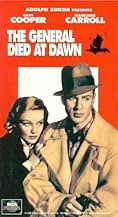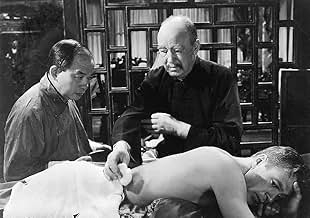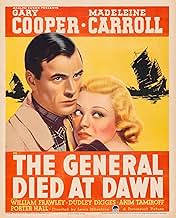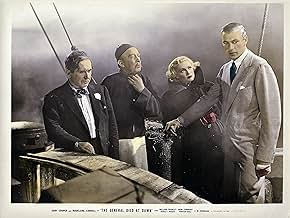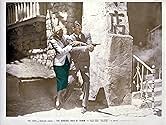PUNTUACIÓN EN IMDb
6,4/10
1,4 mil
TU PUNTUACIÓN
Añade un argumento en tu idiomaAmid the anarchy of China, an American mercenary tangles with a ruthless warlord.Amid the anarchy of China, an American mercenary tangles with a ruthless warlord.Amid the anarchy of China, an American mercenary tangles with a ruthless warlord.
- Dirección
- Guión
- Reparto principal
- Nominado para 3 premios Óscar
- 1 premio y 3 nominaciones en total
Lee Tong Foo
- Mr. Chen
- (as Lee Tung-Foo)
Hans Fuerberg
- Yang's Military Advisor
- (as Hans Furberg)
Irene Bennett
- Passenger
- (sin acreditar)
Spencer Chan
- Killer
- (sin acreditar)
Thomas Chan
- Houseboy
- (sin acreditar)
Reseñas destacadas
I was surprised at the low rating for this film at IMDb, 6.7 as of this writing. I found it a very enjoyable film. I'm a sucker for strong, moody visuals, and this film sure has them. In fact, about half way through I began to wonder, with all the shadows and fishing nets, if this were a Von Sternberg film. The script, which some reviewers found too wordy or too preachy, I found very engaging. The pacing was excellent.
Some reviewers have taken offense at the two main Chinese characters being played by occidentals who spoke pigeon English. Well, that's how films were made back then. Sure it seems unfair to modern viewers. It was unfair. Is that reason to trash the whole film? The Asian actors who had speaking roles came across as intelligent and well spoken.
If you're in the mood for some dark, exotic espionage, I definitely recommend this.
Some reviewers have taken offense at the two main Chinese characters being played by occidentals who spoke pigeon English. Well, that's how films were made back then. Sure it seems unfair to modern viewers. It was unfair. Is that reason to trash the whole film? The Asian actors who had speaking roles came across as intelligent and well spoken.
If you're in the mood for some dark, exotic espionage, I definitely recommend this.
Did you ever come in late to a movie and miss the beginning? You have to try hard to concentrate and catch up, all the while feeling off-balance and wondering how much you missed. That's the way this picture starts off, and I spent some time trying to 'fit in' to the plot. But this film's plot moves at break-neck speed and made me think it is an editing flaw.
Having recovered, I found the story completely original and refreshing (can't think of too many Chinese Civil War flicks!). I also found a lack of tension - what's the opposite of nerve-wracking? - as there is no sense of urgency to the proceedings. The principals were just fine; Gary Cooper, Madeleine Carroll and Akim Tamiroff, and special mention must be made of Philip Ahn, who was the personification of evil Japanese military in many WWII pictures.
It is worth viewing but is a minor entry in the Gary Cooper canon. I liked it and recommend it but I plan to watch it again soon because I think it is one of those pictures in which some subtlety is overlooked in only one viewing.
Having recovered, I found the story completely original and refreshing (can't think of too many Chinese Civil War flicks!). I also found a lack of tension - what's the opposite of nerve-wracking? - as there is no sense of urgency to the proceedings. The principals were just fine; Gary Cooper, Madeleine Carroll and Akim Tamiroff, and special mention must be made of Philip Ahn, who was the personification of evil Japanese military in many WWII pictures.
It is worth viewing but is a minor entry in the Gary Cooper canon. I liked it and recommend it but I plan to watch it again soon because I think it is one of those pictures in which some subtlety is overlooked in only one viewing.
Between masterworks such as "All Quiet on the Western Front" (1930) and "The Strange Love of Martha Ivers" (1945) the Moldovan born Lewis Milestone had a mixed career. He made a bunch of good movies, a bunch of bad ones, and several bunches of films that have just been forgotten. Somewhere in here we also encounter "The General Died at Dawn" (1936), an interesting adventure film set in China. The film features the first screenplay by Clifford Odets, then one of the hottest playwrights around. Even though the film boasts a charismatic ensemble of actors, it often feels like the real star here is the screenplay.
The movies opens very strong. We are introduced to the plight of the poor Chinese, who struggle against a ruthless warlord General Yang, played by Akim Tamiroff in an Oscar-nominated role. Gary Cooper is our idealist hero, a guy who could never catch an even break, and is now trying to give the Chinese one. Coop is something of a spy, carrying important money shipment to the people fighting Yang, but unfortunately Yang has his own spies and is very much on to him...
I would go as far as to call the first half an hour (or so) of this film a masterpiece. Coop is introduced wonderfully, he has a monkey named Sam as a sidekick, and the whole train sequence, featuring the female lead Madeleine Carroll, and eventually Tamiroff as Yang, is wonderfully written. The suspense of the narrative feels real, but the screenplay also has time to be witty and funny. Cooper gets great lines, and throws a few unexpected (yet so enjoyable) punches around as well. I laughed a bunch and was rooting for the hero, rooting for the film really.
Unfortunately after the first third of the film, the narrative takes several missteps. All the important characters go their different ways for too long of a period, and by the time they are all in the same space again, the film has lost its momentum. The ending is not bad, but it is nothing breathtaking either. The film also runs into some trouble, when it can't quite decide, how it wants to portray General Yang and his men.
Still, I would very much recommend this to fans of classic Hollywood. Cooper gets a really good role as our hero, and Tamiroff is very memorable as Yang. Tamiroff was originally Armenian, so in Hollywood-land, that will have to pass as Chinese. I do, however, seriously wish they hadn't turned poor Dudley Digges into Mr. Wu. That was a bit cringe-worthy.
The movies opens very strong. We are introduced to the plight of the poor Chinese, who struggle against a ruthless warlord General Yang, played by Akim Tamiroff in an Oscar-nominated role. Gary Cooper is our idealist hero, a guy who could never catch an even break, and is now trying to give the Chinese one. Coop is something of a spy, carrying important money shipment to the people fighting Yang, but unfortunately Yang has his own spies and is very much on to him...
I would go as far as to call the first half an hour (or so) of this film a masterpiece. Coop is introduced wonderfully, he has a monkey named Sam as a sidekick, and the whole train sequence, featuring the female lead Madeleine Carroll, and eventually Tamiroff as Yang, is wonderfully written. The suspense of the narrative feels real, but the screenplay also has time to be witty and funny. Cooper gets great lines, and throws a few unexpected (yet so enjoyable) punches around as well. I laughed a bunch and was rooting for the hero, rooting for the film really.
Unfortunately after the first third of the film, the narrative takes several missteps. All the important characters go their different ways for too long of a period, and by the time they are all in the same space again, the film has lost its momentum. The ending is not bad, but it is nothing breathtaking either. The film also runs into some trouble, when it can't quite decide, how it wants to portray General Yang and his men.
Still, I would very much recommend this to fans of classic Hollywood. Cooper gets a really good role as our hero, and Tamiroff is very memorable as Yang. Tamiroff was originally Armenian, so in Hollywood-land, that will have to pass as Chinese. I do, however, seriously wish they hadn't turned poor Dudley Digges into Mr. Wu. That was a bit cringe-worthy.
Lewis Milestone is surely one of the most under-appreciated directors from Hollywood's Golden Era. He may be the best example to illustrate how cinematographers and film editors have less to do with how good a movie looks than the director himself. Lewis Milestone's pictures exhibit the same fluid, sensuous, exhilarating black and white cinematography and silky smooth scene changes no matter who his camera man and editor were. The fluid movement of his camera was his trade mark and an innovative style much copied, especially in the 'forties. He is in fact credited with the invention of the camera dolly while filming the early talkie classic All Quiet On The Western Front (1930).
In The General Died At Dawn the gorgeous cinematography finds a worthy subject of concentration in the breath-taking beauty of leading lady Madeleine Carroll, who plays a tormented femme fa-tale, manipulated into wicked and even murderous money-making schemes by her terminally ill and morally challenged father (Porter Hall). When she has to lure idealistic soldier of fortune Gary Cooper into the clutches of cruel, tyrannical Chinese warlord Akim Tamiroff, she quite naturally falls in love with him -- Cooper, not Tamiroff, of course! Miss Carol has never looked lovelier than in this picture. As she reached thirty years of age, a dawning maturity was adding character to her beauty and endowing her gorgeous face with an aching sensuality. Okay, trying to describe what makes a beautiful woman that way is like trying to describe what makes Oreo cookies taste so good. Believe me, Madeleine had it! Not to mention, she was a terrific actress!
When Gary Cooper is on screen, he doesn't have to worry about anyone stealing attention, even a beaut like Madeline Carroll. Tamiroff, who earned an Accademy Award nomination for his role, is bizarrely riveting, as he was in nearly every movie appearance. Good support is also provided by Hall in one of his best performances, Dudley Digges, and William Frawley. Frawley is rather irritating, as in all his roles, but it was intended here.
The plot is confusing at times, and doesn't always make complete sense, but it wasn't so difficult to keep up with as others have carried on. Compared to, say, The Big Sleep (1946), it was as easy to follow as The Three Little Pigs. Whatever the story, Milestone knew how to reel it out in a way that would keep your peepers glued to the screen. This style of suspenseful story-telling immersed in eye-grabbing cinematography would be honed to a fine edge in the next decade with his masterpieces Edge Of Darkness (1943) (see my review) and The Strange Loves of Martha Ivers (1946). In fact this 1936 movie's flowing camera work, oblique angles, frequent night scenes, and dark, brutal story seem to be pointing the way to the stylish noir thrillers of the next decade.
The General Died At Dawn has everything you could ask from a movie -- top stars, exciting action, gorgeous cinematography. Top-notch Old Hollywood entertainment from the smoothest of the smooth, Lewis Milestone!
In The General Died At Dawn the gorgeous cinematography finds a worthy subject of concentration in the breath-taking beauty of leading lady Madeleine Carroll, who plays a tormented femme fa-tale, manipulated into wicked and even murderous money-making schemes by her terminally ill and morally challenged father (Porter Hall). When she has to lure idealistic soldier of fortune Gary Cooper into the clutches of cruel, tyrannical Chinese warlord Akim Tamiroff, she quite naturally falls in love with him -- Cooper, not Tamiroff, of course! Miss Carol has never looked lovelier than in this picture. As she reached thirty years of age, a dawning maturity was adding character to her beauty and endowing her gorgeous face with an aching sensuality. Okay, trying to describe what makes a beautiful woman that way is like trying to describe what makes Oreo cookies taste so good. Believe me, Madeleine had it! Not to mention, she was a terrific actress!
When Gary Cooper is on screen, he doesn't have to worry about anyone stealing attention, even a beaut like Madeline Carroll. Tamiroff, who earned an Accademy Award nomination for his role, is bizarrely riveting, as he was in nearly every movie appearance. Good support is also provided by Hall in one of his best performances, Dudley Digges, and William Frawley. Frawley is rather irritating, as in all his roles, but it was intended here.
The plot is confusing at times, and doesn't always make complete sense, but it wasn't so difficult to keep up with as others have carried on. Compared to, say, The Big Sleep (1946), it was as easy to follow as The Three Little Pigs. Whatever the story, Milestone knew how to reel it out in a way that would keep your peepers glued to the screen. This style of suspenseful story-telling immersed in eye-grabbing cinematography would be honed to a fine edge in the next decade with his masterpieces Edge Of Darkness (1943) (see my review) and The Strange Loves of Martha Ivers (1946). In fact this 1936 movie's flowing camera work, oblique angles, frequent night scenes, and dark, brutal story seem to be pointing the way to the stylish noir thrillers of the next decade.
The General Died At Dawn has everything you could ask from a movie -- top stars, exciting action, gorgeous cinematography. Top-notch Old Hollywood entertainment from the smoothest of the smooth, Lewis Milestone!
The General Died at Dawn, the title itself is enough of a giveaway as to what happens. But the circumstances leading up to the death of Chinese Warlord Akim Tamiroff is quite a tale.
The setting for this film is Kuomintang China where the government of Chiang Kai-Shek doesn't have its writ run very far. Most of China in the Twenties is controlled by various provincial warlords. In fact a case could be made that the Chinese Communists under Mao Tse-tung was viewed as just another warlord. But that's a whole different story.
American adventurer Gary Cooper has a money belt with a whole lot of cash in it entrusted to him by the opposition faction to Akim Tamiroff. He's supposed to make contact with William Frawley in Shanghai who when he's not drinking the hotel bar dry, runs guns.
But Madeleine Carroll and her father Porter Hall who are working for Tamiroff help Tamiroff part Cooper from his money. In the case of Coop, he's real guilty of thinking with his gonads. Then Porter Hall steals the money for himself and the film gets real interesting.
There's one big flaw in the film, occurring when Madeleine Carroll who starts falling for Cooper, refers to him as the "O'Hara Boy." O'Hara is Cooper's character name. Coop was 35 when this film was made and referring to him as 'boy' was ludicrous. But then again a man of 35 should have been on better guard. Film might have worked better if someone younger like Robert Taylor or Tyrone Power played the part of O'Hara. Or Clifford Odets's script should have given Carroll a more elaborate ruse to play on Cooper.
Two major oriental roles were given to occidental players. Casting like Akim Tamiroff as the warlord Yang and Dudley Digges as Mr. Wu who employs Cooper would never happen today. But both do well and come to think of it Tamiroff does have an oriental strain in his ancestry.
One bit of casting really hits home. By all accounts William Frawley was hardly the lovable tightwad Fred Mertz in real life. He was a misanthropic alcoholic in the tradition of W.C.Fields and a mean drunk when he was loaded which was often back then. His role as Brighton, the misanthropic, mean, and thoroughly racist gunrunner was way closer to the real Bill Frawley.
Gary Cooper in The General Died at Dawn was playing a role that Humphrey Bogart would probably have done in the forties. It was always joked that Cooper's dialog consisted of 'yup' and 'nope.' But the way he gets himself, Carroll and Digges out of a real predicament in the end called for quite a gift of gab.
The setting for this film is Kuomintang China where the government of Chiang Kai-Shek doesn't have its writ run very far. Most of China in the Twenties is controlled by various provincial warlords. In fact a case could be made that the Chinese Communists under Mao Tse-tung was viewed as just another warlord. But that's a whole different story.
American adventurer Gary Cooper has a money belt with a whole lot of cash in it entrusted to him by the opposition faction to Akim Tamiroff. He's supposed to make contact with William Frawley in Shanghai who when he's not drinking the hotel bar dry, runs guns.
But Madeleine Carroll and her father Porter Hall who are working for Tamiroff help Tamiroff part Cooper from his money. In the case of Coop, he's real guilty of thinking with his gonads. Then Porter Hall steals the money for himself and the film gets real interesting.
There's one big flaw in the film, occurring when Madeleine Carroll who starts falling for Cooper, refers to him as the "O'Hara Boy." O'Hara is Cooper's character name. Coop was 35 when this film was made and referring to him as 'boy' was ludicrous. But then again a man of 35 should have been on better guard. Film might have worked better if someone younger like Robert Taylor or Tyrone Power played the part of O'Hara. Or Clifford Odets's script should have given Carroll a more elaborate ruse to play on Cooper.
Two major oriental roles were given to occidental players. Casting like Akim Tamiroff as the warlord Yang and Dudley Digges as Mr. Wu who employs Cooper would never happen today. But both do well and come to think of it Tamiroff does have an oriental strain in his ancestry.
One bit of casting really hits home. By all accounts William Frawley was hardly the lovable tightwad Fred Mertz in real life. He was a misanthropic alcoholic in the tradition of W.C.Fields and a mean drunk when he was loaded which was often back then. His role as Brighton, the misanthropic, mean, and thoroughly racist gunrunner was way closer to the real Bill Frawley.
Gary Cooper in The General Died at Dawn was playing a role that Humphrey Bogart would probably have done in the forties. It was always joked that Cooper's dialog consisted of 'yup' and 'nope.' But the way he gets himself, Carroll and Digges out of a real predicament in the end called for quite a gift of gab.
¿Sabías que...?
- CuriosidadesThe main character, O'Hara, is based on the real-life adventurer Morris "Two-Gun" Cohen (1887-1970). Born in Poland to a Jewish family, Cohen grew up in the tough streets of London's East End. As a teenager, he moved to western Canada and became a ranch hand and gambler in Saskatchewan, and later a highly successful real-estate agent in Alberta. During World War I he fought in Europe with the Canadian Railway Troops. His friendship with Chinese workers on the Canadian-Pacific Railroad prompted him to go to China in the 1920s. After negotiating a railroad deal with Dr. Yat-sen Sun, Cohen became a personal bodyguard to Sun and a trainer of Sun's private army. After Sun's death in 1925, Cohen ran guns for various Chinese warlords throughout the 1930s. When the Japanese invaded China in 1937, Cohen continued to supply Chinese resistance forces with arms and served with the British SOE. In 1941, following the fall of Hong Kong, he was captured by the Japanese and put in a prison camp, but was traded to the English in 1943 in a rare prisoner exchange. After the war, Cohen continued to operate in China as an agent for various British firms, including Rolls-Royce and Decca Radar. His former dealings with Chinese warlords kept him in good standing with Chinese Communist officials until his death in 1970.
- PifiasWhile arguing with Peter, Judy slams a book down on the desk. A couple of other books on the corner of the desk disappear in a later scene.
- Créditos adicionalesThe opening credits all appear on the sails of boats.
- ConexionesFeatured in Red Hollywood (1996)
Selecciones populares
Inicia sesión para calificar y añadir a tu lista para recibir recomendaciones personalizadas
- How long is The General Died at Dawn?Con tecnología de Alexa
Detalles
- Fecha de lanzamiento
- País de origen
- Idioma
- Títulos en diferentes países
- The General Died at Dawn
- Localizaciones del rodaje
- Empresa productora
- Ver más compañías en los créditos en IMDbPro
- Duración1 hora 38 minutos
- Color
- Relación de aspecto
- 1.37 : 1
Contribuir a esta página
Sugerir un cambio o añadir el contenido que falta

Principal laguna de datos
By what name was El general murió al amanecer (1936) officially released in India in English?
Responde
